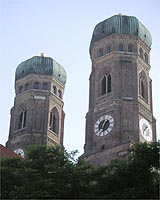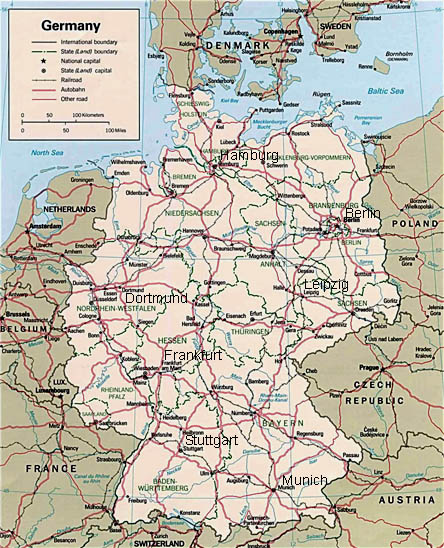![[Go to Top] [Munich Icon]](icons/logo1.jpg)


|
United States of America
New York, NY
Washington, D.C.
Braintree, MA
Columbus, GA
St. George Island, FL
Charleston, SC
San Francisco, CA
Los Angeles, CA
Pasadena, CA
Disneyland, CA
Sandpoint, ID
Coeur d' Alene, ID
Spokane, WA
Clark Fork, ID
Hope, ID
New Port, WA
Priest River, ID
Bonners Ferry, ID
Fort Steele, BC
|
|



![[Go to Top] [Munich Icon]](icons/logo7.jpg)
|
|
City Data of Munich
|
Map of Germany

|
General Information
Continent: Europe
Country: Germany
Region: Bavaria
City: Munich
Local Name: München
Coordinates:
48:08:00N 11:35:00E
Altitude: 508m / 1669ft
Time Zone:
Central European Time (CET)
Munich Population
City: 1,321,557 (1996)
City Area:
310.5km2 119.9 mile2
City density:
4256 inh/km2
11022 inh/mile2
|
Overview
Munich is the capital of the German Federal State of Bavaria (German: Freistaat Bayern) which is Germany's third largest city and one of Europe's most prosperous and expensive. The city has a population of about 1.3 million (as of 2006) and the Munich metropolitan area is home to around 2.7 million people. The city is located on the River Isar north of the Bavarian Alps.
The city's motto was "Die Weltstadt mit Herz" (The world city with a heart) for a long time but has recently been replaced by "Munchen mag dich" (Munich loves you). The figure on Munich's coat-of-arms is a monk referred to as the Munchner Kindl, the child of Munich. Black and gold - the colours of the Holy Roman Empire - have been the city's official colours since the time of Louis IV, Holy Roman Emperor.
Geography
Setting : Munich lies on the elevated plains of Upper Bavaria, about 50 km north of the northern edge of the Alps, at an altitude of about 520 m. Munich is situated in the Northern Alpine Foreland. The northern part of this sandy plateau includes a highly fertile flint area which is no longer affected by the folding processes found in the Alps, while the southern part is covered by morainic hills. In between there are fields of fluvio-glacial out-wash, like around Munich. Wherever these deposits get thinner, the ground water can permeate the gravel surface and flood the area, leading to marshes as in the north of Munich.
Climate : Because of the city's altitude and proximity to the northern edge of the Alps, precipitation is rather high. Rain storms often come violently and unexpectedly. The range of temperature between day and night or summer and winter can be extreme. A warm downwind from the Alps (Fohn) can change the temperatures completely within a few hours, even in the winter. Winters last from December to March. Munich experiences rather cold winters, but heavy rainfall is rarely seen in the winter. The coldest month is January with an average temperature of -2C (28F). Snow cover is seen for at least a couple of weeks during winter. Summers in Munich city are fairly warm with average temperature of 19C (65) in the hottest month of July. The summers last from May till August. In the summer, there is frequent rainfall accompanied by thunderstorms.
*Quoted from Wikipedia
Banks and Currency Exchange
Not all banks keep the same hours. The following information is based on the average bank opening hours in Munich. Banks are normally open from 9 a.m. to 1 p.m. and from 2 p.m. to 3/ 4 p.m. on weekdays, and until 5/ 6 p.m. on Thursdays. They are closed on Saturdays and Sundays. All banks provide 24-hour cash machines which accept most credit cards such as MasterCard, VISA, Maestro or American Express. The bank at the Central Station is open daily from 6 a.m. to 11 p.m.; at the Airport from 7 a.m. to 8.30 p.m. You can find a travel service at the central branch of the Sparkasse, just around the corner from the main square, Marienplatz.
Credit Cards
Most hotels, restaurants, stores, train stations and taxis accept all major credit cards. However, it is also recommended that visitors carry small amounts of cash in the form of Euros at all times for everyday expenses.
Driving in Germany
In Germany we drive on the right hand side of the road. So please remember this not only for driving but, also for cycling to and from the conference venues.
Electrical Current
The electrical current in Germany is 220V. Appliances designed to operate on 110V will require a transformer.
Gratuities
The bill you receive at a hotel, restaurant, cafe or bar often includes a service charge already. A tip is an indication of your satisfaction ? 5% is average, whereas 10% indicates exceptional service. Tip taxi drivers about 5% and porters and others who assist you with baggage one Euro per item.
Language
The native tongue is German but English is widely spoken.
Newspapers
One of Germany's leading daily papers ? "Suddeutsche Zeitung" - features national and international news and reports. "Munchner Merkur" focuses on the greater area and is very strong in reporting news from both the city and the surrounding areas, as well as national and international news. A selection of international papers is available at several places in the city.
Pharmacies
Prescription and non-prescription medicine is generally available at pharmacies from Monday through Friday between 8 a.m. and 6/ 7 p.m., and on Saturdays from 8 a.m. to 12.30/2 p.m. There are also drug stores that sell non-prescription medicine during normal opening hours. 24-hour pharmacy service is provided on a rotating basis.
Police Call & Emergency Medical Services
To contact the police dial 110, to contact the fire brigade or emergency medical services dial 112. Hotel staff members can direct guests to local emergency centres, hospitals or dental clinics.
Postal services
The opening hours on weekdays are from 8 a.m. to 6.30 p.m. and on Saturday from 8 a.m. to 12.30/2/6 p.m., but they are closed on Sunday.
Shopping and Local Opening Hours
Stores in Munich open between 9 a.m. and 10 a.m. Most close between 6 p.m. and 8 p.m. Monday through Saturday. On Sunday almost all stores are closed, the exceptions being gas stations and convenience stores, which carry some food items as well as snacks and beverages.
Smoking
Public institutions are smoke free zones. A great number of hotels offer non-smoking rooms or have non-smoking floors. In pubs, night cubs, cafes and restaurants smoking is allowed. A lot of restaurants already have non-smoking areas.
Taxi
Most Munich taxis have a very high standard (Mercedes-Benz cars). The fares depend on the distance and the velocity and are determined by a meter. After the ride you pay the price displayed on the meter. If you have bulky luggage with you, there will be a small extra charge. There are a great number of taxis ? especially at the bigger hotels and at most points of interests and at many underground stations.
Telephone Cards
Phone Cards can be bought from post offices and kiosks. They are available in various different denominations and work out significantly cheaper than using a mobile phone.
Germanyfs country code is 49; Munichfs area code is (0)89. For directory assistance in Germany dial 11833, for international directory assistance 11834.
Time Zone
The time zone in Germany is Greenwich Mean Time (GMT) + 1 hour and six hours ahead of Eastern Standard Time (EST). In Germany, clocks are set to Central European time. From the end of March to the end of October (summertime) they are put forward one hour.
Travel
Munich is well served by airport, train and road links. Delegates arriving by airplane are advised that the International Airport Munich is about 22 miles (35 km) from the city centre (regular suburban train line S1 and S 8, bus service, taxi fare about ? 55.00).
VAT Refunds and Tax-free Shopping
Prices for goods and services in Germany always include a 16% value-added tax (VAT). This tax will be increasing to 19% from 2007. Some or all of the VAT may be refundable for goods purchased at stores displaying the gTax-Free for Touristsh sign. You need to request a tax-free form upon making a purchase. Before leaving the country and before checking any luggage, present the purchased goods, the tax-free form and your receipt to German customs officials at the airport. They will certify the form as proof of legal export. You may then obtain a cash refund at one of the Tax-Free Shopping Service counters located at all major border crossings, airports, ferry ports and train stations.
Visa requirements for entry into Germany
Citizens of the countries belonging to the European Union do not require a visa to enter Germany. Generally speaking, citizens of all other countries must have a visa to enter the country. For more information please visit www.auswaertiges-amt.de
*Quoted from velo-city2007.com
|
|